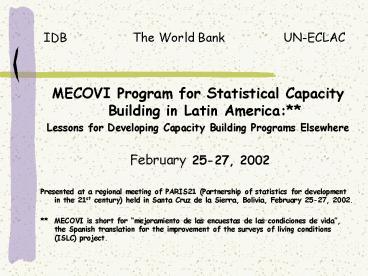MECOVI Program for Statistical Capacity Building in Latin America:** - PowerPoint PPT Presentation
Title:
MECOVI Program for Statistical Capacity Building in Latin America:**
Description:
IDB The World Bank UN-ECLAC MECOVI Program for Statistical Capacity Building in Latin America:** Lessons for Developing Capacity Building ... – PowerPoint PPT presentation
Number of Views:65
Avg rating:3.0/5.0
Title: MECOVI Program for Statistical Capacity Building in Latin America:**
1
IDB The World Bank
UN-ECLAC
- MECOVI Program for Statistical Capacity Building
in Latin America - Lessons for Developing Capacity Building Programs
Elsewhere - February 25-27, 2002
- Presented at a regional meeting of PARIS21
(Partnership of statistics for development in the
21st century) held in Santa Cruz de la Sierra,
Bolivia, February 25-27, 2002. - MECOVI is short for mejoramiento de las
encuestas de las condiciones de vida, the
Spanish translation for the improvement of the
surveys of living conditions (ISLC) project.
2
What is the MECOVI Program?
- Improvement of the surveys and measurement of
living conditions (ISLC/MECOVI) in Latin America
and the Caribbean (LAC) - A regional capacity building program sponsored by
IDB, World Bank and UN-ECLAC initially (1997)
and with participation by more donors Canada,
Denmark, Germany, Japan, Norway, Sweden, UNDP,
etc.
3
Why the MECOVI Program?
- Focus on improving the micro-data at household
level to inform public policies aimed at reducing
poverty - Distilling and applying the lessons from past
efforts at capacity building (UN programs, LSMS,
SDAs, etc.)
4
Program Objectives
- Improve quality and relevance of household
surveys questionnaire design, training, quality
control, etc. - Promote wide utilization of improved data for
research and policy work - Promote free accessibility of the survey data by
the general public
5
Program Components
- Country-specific TA programs (Argentina,
Bolivia, Dominican Republic, El Salvador,
Guatemala, Honduras, Nicaragua, Paraguay, Peru) - Regional seminars/workshops, and regional
training courses on household surveys and poverty
analysis - Regional data bank
6
Methodologies for Improving the Surveys in
Country-Specific TA Programs
- Reduce sampling errors ? improvement of sample
frame and optimal distribution of samples in
organization of fieldwork - Reduce non-sampling errors ? improved
questionnaire design, data collection, data
entry, consistency checks, and data editing - Sponsor policy-oriented research that uses the
survey data to create feedback to data producers
7
Methodologies for Improving the Surveys with
Regional Activities
- Regional workshops on survey methodology, poverty
analysis, and social indicators ?
expert input and sharing of best practices - Regional training courses for producers and users
of the survey data ? focus on hands-on training - Regional data bank ? encourage wide accessibility
of the survey data
8
Key Design Features of the MECOVI ProgramCommon
Agreed Framework for Cooperation
- Responding to the data needs to support policies
aimed at reducing poverty and improving social
welfare - Shared vision that capacity building needs
commitments to longer-term efforts by countries
and development partners - The MECOVI program serving as an operational
platform to mobilize donor support to organize
technical cooperation for sustainable capacity
building
9
Key Design Features of the MECOVI ProgramProgram
Governance and Coordination
- Clear mechanism for governance, counsel, and
inter-institutional collaboration - Steering Committee decides on key matters of
policy, planning and resource mobilization - Advisory Board advises on technical issues
- Program Coordinators handle day-to-day
operational matters, including coordination,
project development and preparation, and
implementation
10
Key Lessons from MECOVI Program Country-Specific
TA Programs
- Program development and project design should be
linked to country capacity and the existing needs - Active role of the National Statistical Offices
(NSOs) and wide consultation with stakeholders
create country buy-in - Interaction of producers and users of the survey
data increases the viability of the program - Capacity building and democratization of
statistical information take time - Close coordination and monitoring create more
than the sum total of individual efforts - Explicit attention should be paid to exit
strategy upon project completion at the program
design stage to ensure sustainability
11
Key Lessons from MECOVI Program Regional MECOVI
Activities
- Regional activities served as
- Venues for data producers and users to interact
with and learn from each other - Forum to promote best practices in statistical
capacity building in surveys and poverty analysis - Opportunities for statistical staff and policy
analysts to receive hands-on training with real
country data applied to real world problems
(poverty and welfare analysis, labor and other
social policies, etc.)
12
Working with Partners to Support Poverty
Reduction Strategies (PRS)
- MECOVI-like capacity building program supports
the demanding data needs of country-driven PRSPs
to monitor poverty and social indicators, and
conduct impact evaluation - MECOVI-like program provides a useful framework
for development partners to collaborate in
support of the country-driven PRS - A Consortium of Partnership in statistics for
development in the 21st century (PARIS21)
provides important support to local statistical
capacity building and MECOVI-like regional
initiatives
13
Developing the Caribbean MECOVI Program
- Finding shared vision and agreed framework for
technical cooperation for capacity building among
the Caribbean development stakeholders through
consultation with Development Partners on Poverty
Working Group (DPPWG) from March 2000 - Country buy-in was created by organizing a
consultation meeting with representatives from
policymaking circle of planning and finance as
well as statisticians (A Consultation Meeting,
Georgetown, Guyana, December 17, 2001) - Consideration of local capacity, policy
environments, and institutional structure is
important in designing a customized regional
program for capacity building
14
Poverty Analysis and Data Initiative (PADI) for
East Asia
- Poverty Analysis and Data Initiative (PADI) for
East Asia is being developed by the World Bank
Institute (WBI) in partnership with local
partners - Application of innovative methodologies of
training of trainers to leverage scarce capacity
building resources - Need for further inter-agency coordination for
sustainable program development and fund-raising































